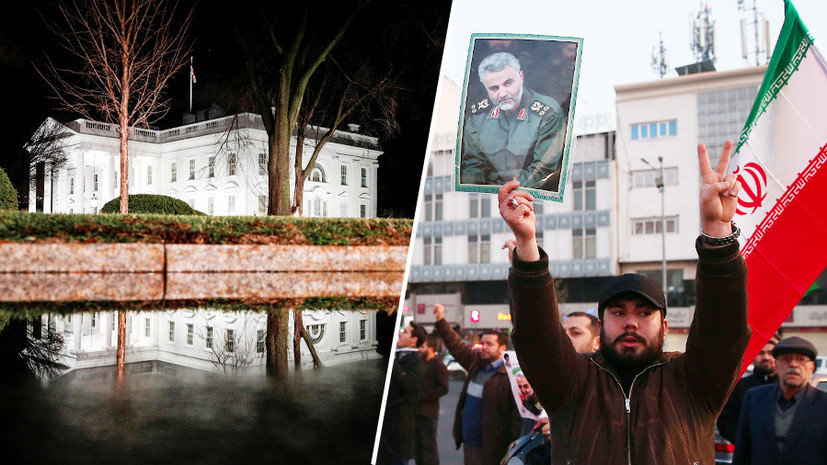US Vice President Mike Pence said the Iranian leadership, according to some reports, called for refraining from further attacks on US forces in the Middle East. According to the politician, the corresponding order was sent to factions supported by Tehran.
“We are receiving encouraging intelligence that Iran is sending a signal to these armed groups so that they do not attack American targets or civilians. And we hope that this signal continues to be transmitted, ”Pence said in an interview with CBS.
On the eve of the Permanent Representative of Iran to the UN, Majid Taht-Ravanchi, announced that Tehran had no intention to continue military operations against the United States after responding to the assassination of US forces General KSIR Kassem Suleimani.
“All our actions were proportional to the assassination of Kassem Suleimani. They are completed. If the United States will no longer take military action against Iran, on our part we will not take such actions either, ”Takht-Ravanchi quotes TASS.
The Permanent Representative added that in this situation, Tehran acted exclusively in accordance with Article 51 of the UN Charter, exercising its right to self-defense. Takht-Ravanchi noted that if in Washington "they still decide to take military action, Iran will have no other way but an answer."
Recall that relations between the United States and Iran sharply escalated after the US military launched a missile strike on the outskirts of Baghdad, as a result of which the Iranian General of the Islamic Revolutionary Guards Corps (IRGC) Kassem Suleimani was killed. Among those killed were also the deputy head of the Iraqi Shiite militia Abu Mahdi al-Muhandis and about ten accompanying persons.
After these events, thousands of protests against US policy took place in Iran, mourning for the deceased general was declared in the country. In Tehran, Washington’s actions were equated with the declaration of war.
On the night of January 7-8, Iran launched a series of missile attacks on the locations of US troops in neighboring Iraq. The operation, entitled “Martyr Suleimani,” was a response to the US-sponsored assassination of General IRGC. According to various sources, Tehran fired from 10 to 20 ballistic missiles at American targets. Initially, some Iranian media reported 80 dead as a result of the attack, but Washington denied this information. Iraqi officials also said they did not have data on the victims.
Iran’s Supreme Leader, Ayatollah Ali Khamenei, called the attack on the bases “a slap in the US” and called on the US military to leave the region.
US President Donald Trump, during his address, said that none of the US military was hurt by the Iranian side. However, he did not announce any military action against Tehran, but promised to introduce new sanctions.
Trump also said that as long as he remains the head of state, "Iran will not be allowed to have nuclear weapons." In addition, the head of the White House called on Russia and other countries to withdraw from the “nuclear deal” (the Joint Comprehensive Action Plan for the Iranian Nuclear Program).
A number of U.S. media said Iraq notified Washington of impending Iranian strikes in advance, avoiding casualties. The presence of such data in Baghdad was said by the head of the Iranian Foreign Ministry Mohammad Javad Zarif.
At the same time, The Washington Post, citing sources, writes that Iran’s attacks could be calibrated in such a way as to cause minimal damage. On the one hand, this gave Tehran the opportunity to "save face", and on the other, to avoid unleashing full-scale hostilities.
To gallery page
Pentagon data
According to the American side, the attack of the Iranian forces on the night of January 7-8 was the 15th in a row since September 2019. Such data in a widespread press release was cited by the State Department.
In turn, the head of the Pentagon, Mark Esper, during a special briefing, spoke about the details of the latest attack. According to him, during Operation Martyr Suleimani, Tehran launched 16 ballistic missiles at US military bases, 12 of which reached the target.
According to the head of the Pentagon, at least 11 missiles hit the air base of Ain al-Assad, another one is the base in Erbil. Damage to the helicopter, a number of buildings and a parking area, but there were no serious damage.
According to media reports, among those who listened to the briefing of the US senators' administration there were several people who expressed dissatisfaction with the information provided to them and doubted the expediency of the assassination of the IRG General Kassem Suleimani.
It is worth adding that on January 9, the House of Representatives intends to decide on limiting the powers of US leader Donald Trump to conduct a war with Iran.
Meanwhile, Reuters announced the readiness of the US authorities to negotiate with Tehran to reduce tensions in the Middle East region. According to the agency, US Permanent Representative to the UN Kelly Kraft sent a letter to the UN Security Council stating Washington’s readiness for a dialogue without preconditions “with the goal of preventing a further threat to international peace and stability or escalation from the Iranian regime.”
It is noteworthy that the said document says that the American side argued for the murder of Suleimani by article 51 of the UN Charter, which regulates the right of a member of the organization to self-defense.
Commenting on the proposed “cooperation” proposal, Majid Takht-Ravanchi doubted its feasibility: “When we hear (USA. - RT ) declare possible cooperation and at the same meeting decide to tighten sanctions, such proposals do not make sense” .

